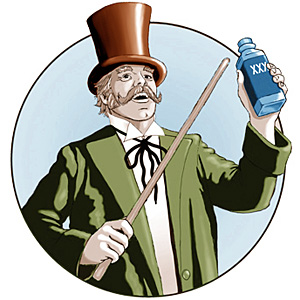So reads the sticky note from my retired entomologist colleague. It’s affixed to the latest flyer promising the "greenest garden in town" using the "best all-time tips, tricks and tonics."
The entire brochure is ludicrous, and picking it apart is like shooting fish in a barrel. But sometimes it’s fun going for the low-hanging fruit. Here are some of the more memorable claims:
Epsom salts – grow sweeter melons, energize your roses, supercharge your grass seed, grow giant geraniums, bust tomato blight, boost your bulbs, force stubborn shrubs to flower, etc. etc. How does plain old magnesium sulfate do all of these miraculous things? The short answer – it doesn’t. There’s not one speck of science behind any of this nonsense. (On a more amusing note, the garden guru’s chemistry is a little shaky. He claims Epsom salts will "give bulbs a dose of much-needed nitrogen." Either that or he’s figured out alchemistic transmutation.)
Barbeque forks – "perfect for spot aeration, harvesting root crops, and mole control." Eeew.
Latex paint – "seal up fresh cuts on trees, shrubs and roses." A colorful way to inhibit a plant’s natural ability to seal wounds.
"Stress reliever tonic" for lawns that contains shampoo, tea, mouthwash, and "chewing tobacco juice." Not only is this a toxic mess, but how is one expected to produce the "chewing tobacco juice?"
Salt – it’s not just for slugs anymore! You can use it on weeds, "bad" worms, poison ivy, and ants. Somehow the "good" plants and insects are immune to the effects?
According to the back of the brochure, our guru has "taught" over 32.7 million people how to misuse common household products in their garden. Incredible.

Unfortunately, a lot of people fall for these snake oil concoctions. But then again, it was a similar brochure that made me realize the value of the Master Gardener program. I get at least a few questions every year about one or another of these tonics and it’s rewarding to be able to point people to the correct information.
Just noodling around google shows many anecdotal successes but has there ever scientific studies done of these “tonics” and others that have been passed down between generations? I remember as a teenager growing tomatoes — which came from starters in the biosolids at the municipal sewage treatment plant — and using the beer et al. concoction to water/feed but some 25 years later, do not remember if it made a difference.
@Jim C. – I can recommend an excellent book by a brilliant writer and knowledgeable Horticulturist that addresses your request:
http://www.timberpress.com/books/9780881929126
The Truth About Garden Remedies
Yes, very entertaining